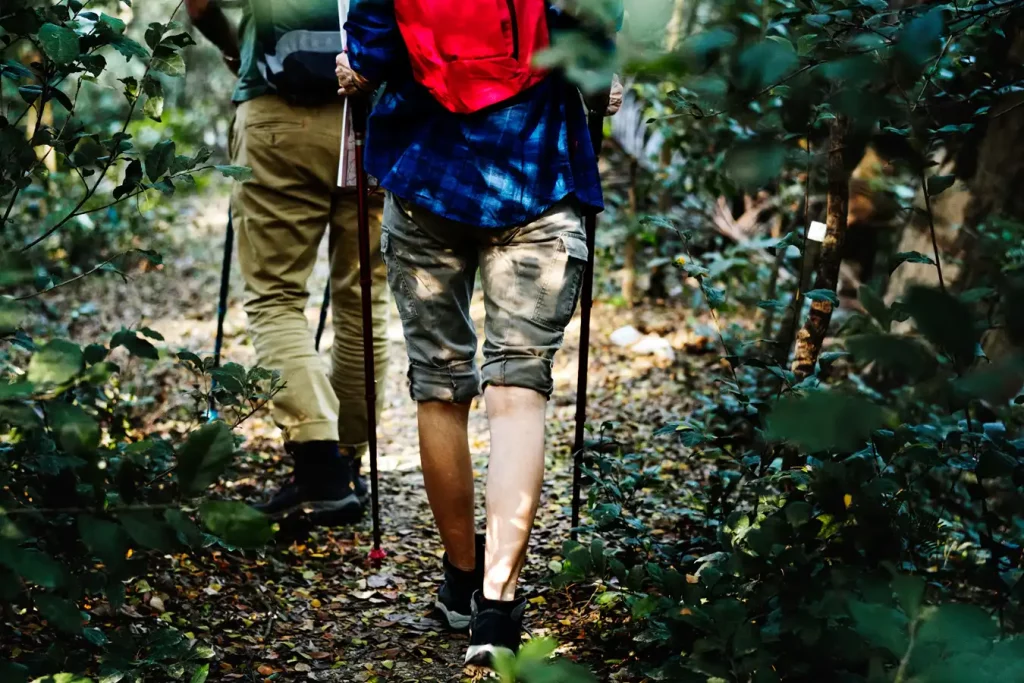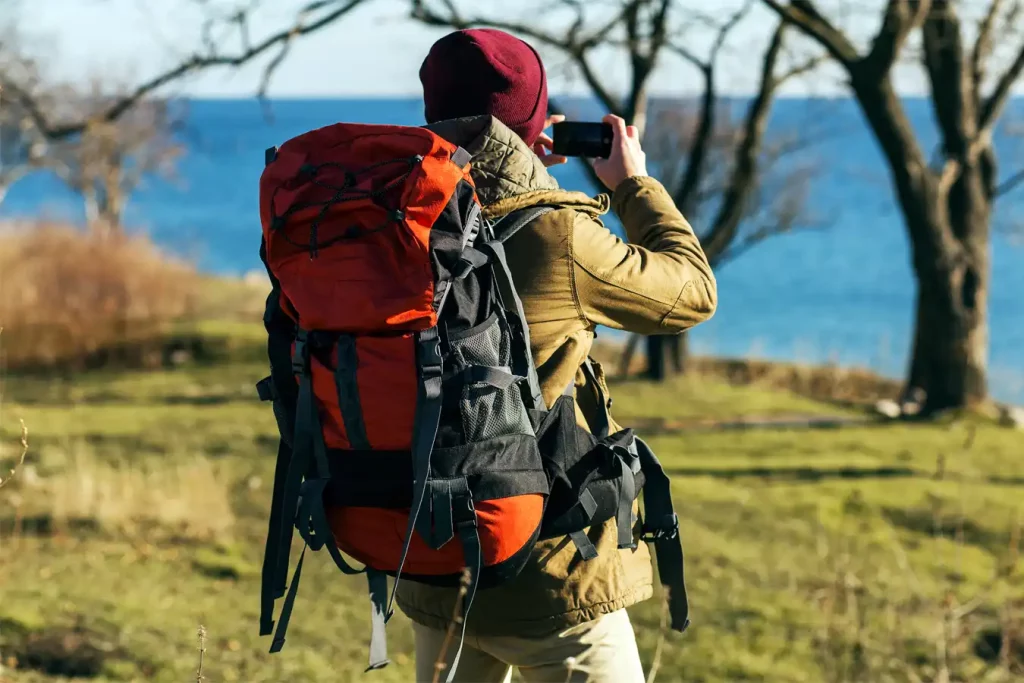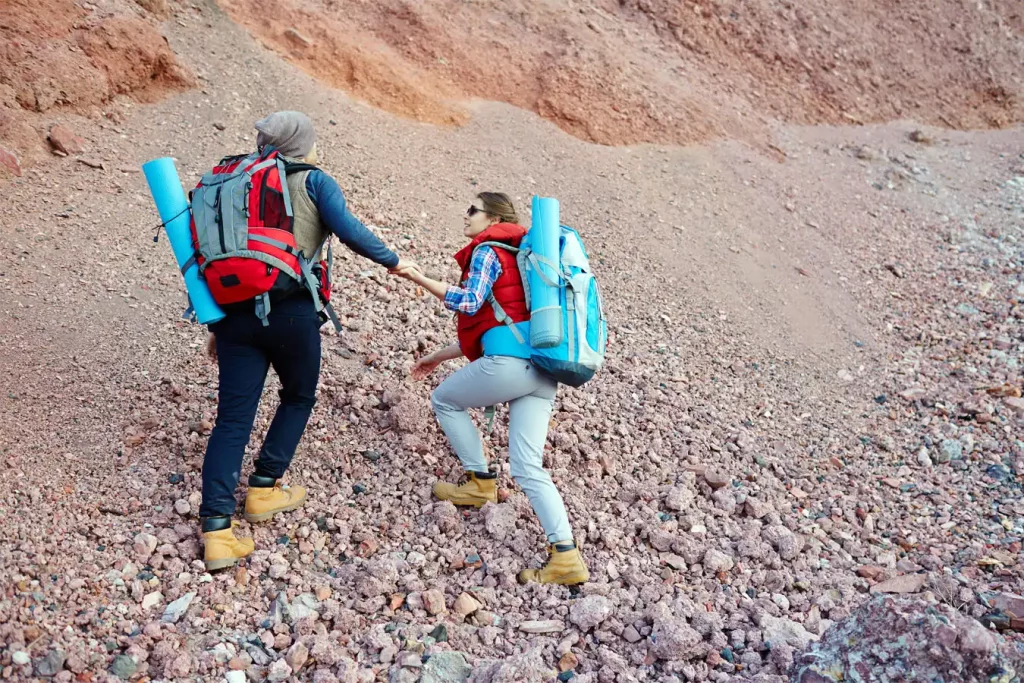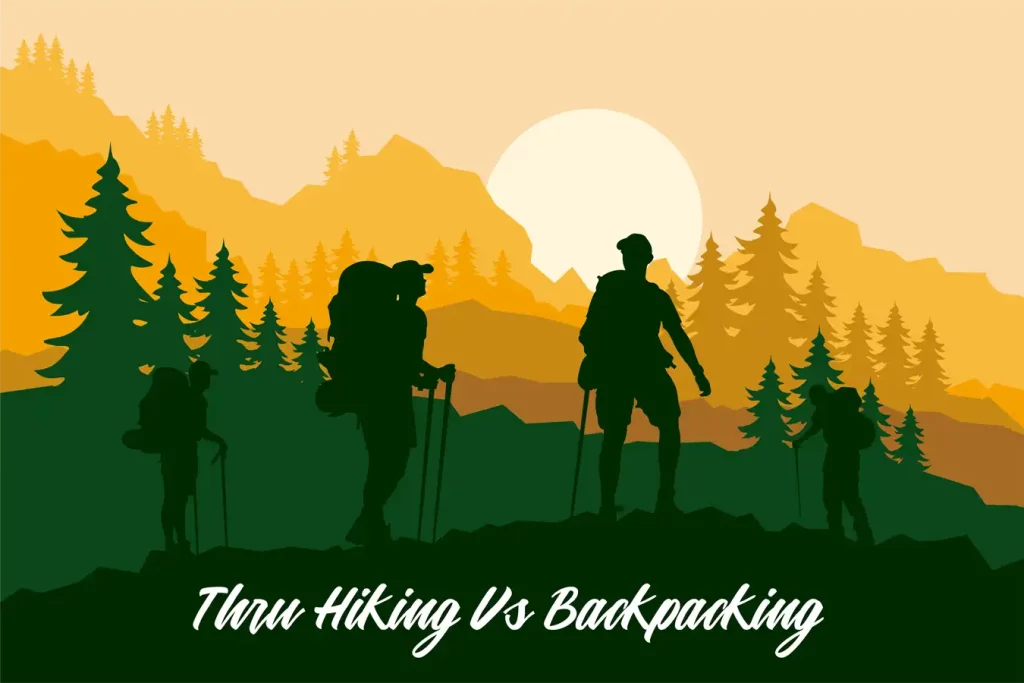Thru hiking vs backpacking: what’s really the difference, you ask?
Honestly, it’s like comparing a marathon to a sprint.
Both will get your heart pumping, but in their own distinct ways.
Imagine wandering vast landscapes for months, and then think of those weekend getaways with your buddies.
See the contrast?
So, grab your favorite trail mix, and let’s dive deep into this fun comparison.
By the end, you’ll be a pro at telling them apart and maybe even inspired to try one yourself!
The Basics of Thru Hiking
Before we blaze any trails, let’s get our footing right on what thru hiking is all about.
What is Thru Hiking?
Thru hiking is the challenging endeavor of hiking an entire long-distance trail, like the Appalachian or Pacific Crest, in one continuous journey.

Thru hiking is like that epic TV series binge but for hiking. Instead of watching episodes back-to-back, you’re hiking a long-distance trail from start to finish in one go. Imagine walking the entirety of the Appalachian Trail – which runs from Georgia to Maine – without detours. It’s not a weekend gig, but a commitment that can take several months, demanding resilience, preparation, and a deep love for nature.
Popular Thru Hiking Trails
- The Appalachian Trail (East Coast, USA): Brimming with history and scenic beauty.
- The Pacific Crest Trail (West Coast, USA): A roller-coaster of elevations, from deserts to snowy mountains.
- Camino de Santiago (Spain): A pilgrimage with spiritual undertones and a lot of heart.
These are just a few names in the vast world of thru hiking. Each trail offers its unique flavor and challenges. It’s like picking a book series – you want to ensure it aligns with your taste and grit.
Essential Gear for Thru Hiking
Ah, gear! My favorite topic. Here’s a shortlist to get you started:
- Backpack: This is your mobile home. Invest in a durable yet lightweight one.
- Shelter: Think tents or tarps, depending on your preference and the trail’s conditions.
- Footwear: Comfort is king. And queen. Basically, the entire royal court.
- Navigation tools: Maps, compasses, and, if you’re like me, the occasional gut feeling!
Food and water supplies: Hydration and nutrition keep you going.
Of course, this is a basic guide. Each trail might require specific gear, so always research before setting out.
Physical and Mental Preparation for Thru Hiking
Thru Hiking isn’t just a physical challenge; it’s a mental marathon. To prep your body, start with shorter hikes, gradually increasing your distance and pack weight. Cross-training, like swimming or yoga, can also benefit your strength and flexibility.
Mentally, anticipate the tough moments. There will be days when every part of you wants to quit. This is where your ‘why’ comes in. Maybe it’s the love for the outdoors, or a personal challenge, or perhaps, like me, you just enjoy the thrill of finishing what you started. Remember that ‘why’ – it’s your mental fuel.
The Basics of Backpacking
Alright, trail-blazers, after our deep dive into thru hiking, let’s pivot to its adventurous cousin – backpacking. This one’s for those who love the thrill of the outdoors but perhaps with a bit more flexibility and spontaneity. Ready? Here we go!
What is Backpacking?
Backpacking is the adventure of traveling with all your essentials packed in a bag, often exploring nature trails or foreign cities for several days at a time.

Okay, imagine this: You’ve got a weekend free, a backpack filled with essentials, and a hunger for some outdoor magic. Backpacking is essentially about taking short (or sometimes longer) trips into the wilderness, setting up camp, and then returning after a few days. It’s less of an epic saga like thru hiking and more of a short story filled with captivating chapters. Whether you’re out for a weekend getaway or a week-long adventure, backpacking allows you to experience nature on your own terms and timeframe.
Popular Backpacking Destinations
- Banff National Park (Canada): A mosaic of lakes, glaciers, and forests. Pure magic, if you ask me!
- Grand Canyon (Arizona, USA): Descend into Earth’s marvel and camp beneath the stars.
- Torres del Paine (Chile): Think vast landscapes with a pinch of dramatic mountain backdrops.
Of course, this is just the tip of the iceberg. Every corner of the world has hidden gems awaiting backpackers. The beauty of backpacking? You can always discover a new favorite spot!
Essential Gear for Backpacking
While there’s some overlap with thru hiking, backpacking gear can be a tad more flexible, considering the shorter durations:
- Backpack: It’s all in the name, right? Something comfy and spacious, without being too hefty.
- Shelter: Tents are popular, but some might opt for hammocks or bivy sacks.
- Footwear: Again, comfort rules. And a pair that’s durable enough for the varied terrains you might tread.
- Cooking supplies: Portable stoves (Amazon), utensils, and food storage. You gotta eat, right?
- Safety essentials: Think first-aid kits, torches, and perhaps a whistle for those “just in case” moments.
Always remember: pack smart, not heavy. The idea is to be well-equipped without straining your back.
Physical and Mental Preparation for Backpacking
Though generally less intense than thru hiking, backpacking still demands a good level of fitness. Start with day hikes, get a feel of your backpack’s weight, and gradually stretch your endurance. As for mental prep, it’s more about embracing spontaneity and the unknown. Expect the unexpected – whether it’s an unplanned detour or a surprise rain shower. Keep an open mind, relish in the adventure, and you’ll be just fine.
Know more: How Much Should a Backpacking Tent Weigh
Thru Hiking Vs Backpacking: The Key Differences
Buckle up, fellow adventurers! Now that we’ve delved deep into both worlds, let’s chat about what really sets thru hiking apart from backpacking. It’s not just about the duration or the gear; there are nuances and subtleties that make each experience unique. Ready to unravel the mysteries? Let’s dive in!
Duration and Distance: Thru Hiking Vs Backpacking
Thru Hiking: Think of this as the marathon of the hiking world. We’re talking about covering extensive trails from start to end, often spanning hundreds (or even thousands) of miles. Most thru-hikers spend months, sometimes the better part of a year, to complete their journey.
Backpacking: It’s more like a sprint or a relaxed jog, depending on your pace. Backpacking trips can vary from a weekend getaway to a week or two. You choose your distance, whether it’s a humble 20 miles or an ambitious 100-mile loop.
Gear and Equipment: Thru Hiking Vs Backpacking
Thru Hiking: Efficiency and weight are key. Imagine carrying a year’s worth of essentials on your back! Thru-hikers often opt for ultralight gear, prioritize necessities, and resupply along the way.
Backpacking: With shorter trips, there’s a bit more wiggle room for comforts. Maybe that extra-cozy sleeping pad or that delicious gourmet trail mix. Still, smart packing is essential – no one wants to lug around unnecessary weight, even for a weekend.

Physical Demands: Thru Hiking Vs Backpacking
Thru Hiking: As you can guess, it’s intense. Consistent long distances, varying terrains, and the wear and tear on the body over months mean you’ve got to be in top shape. Your shoes will wear out, but your spirit shouldn’t!
Backpacking: It’s demanding but in shorter bursts. You might face steep climbs and challenging paths, but you have the luxury of a recovery period post-trip. It’s essential to be fit, but you don’t need to be a seasoned athlete.
Mental Challenges: Thru Hiking Vs Backpacking
Thru Hiking: The mental game is as strong as the physical. Imagine days of relentless rain, missing a crucial resupply point, or just the sheer monotony of walking day in and day out. It’s a test of willpower, resilience, and determination.
Backpacking: The challenges vary. Maybe it’s about navigating an unknown trail, setting up camp before nightfall, or dealing with an unexpected turn in weather. While the duration is shorter, the need for adaptability and a positive mindset remains crucial.
Learn more: What is Unparalleled Hiking
Choosing Between Thru Hiking and Backpacking
Alright, adventurer, let’s get real for a moment. You’ve seen the highlights, the challenges, and the demands of both thru hiking and backpacking. But which trail is for you? It’s not just about lace-up boots and a sense of wanderlust. There’s a lot to consider. Let’s break it down!
Assessing Your Physical Condition
Thru Hiking: Ready to get those legs working? Thru hiking is like a long-distance relationship with the trail. It demands top-notch physical conditioning. And let’s not forget the need for stamina to weather those challenging terrains. If you regularly conquer those 10k runs or have previous multi-day hiking experience, this might be up your alley.
Backpacking: While you don’t need the endurance of a long-distance runner, you do need a reasonable fitness level. Remember, you’ll be carrying all your essentials on your back, trekking for several hours. Do you have a solid weekend warrior vibe going on? Backpacking could be your jam.
Evaluating Your Time Commitment
Thru Hiking: Let’s be clear: this is a commitment. Think long-term relationship, but with nature. You’ll be dedicating months of your life to the trail. Got the time, and more importantly, the inclination for such an immersive experience? Go for it!
Backpacking: More of a fling than a relationship! Perfect if you have a few days to a couple of weeks to spare. It’s all about those short, intense bursts of adventure. If you’re looking for a brief escape from the hustle and bustle, backpacking’s your ticket.
Considering Your Budget
Thru Hiking: It might seem counterintuitive, but long-term hiking can require a hefty budget. Think about it: ultralight gear, trail permits, resupply points, and potential stays at hostels or lodges. Plus, there’s the cost of leaving the “real world” behind, like unpaid leaves or career breaks.
Backpacking: Generally lighter on the pocket. You’re investing in gear, sure, but it’s a shorter timeframe. Less time on the trail often means fewer costs. But always plan and budget for unexpected trail expenses!
Understanding Your Personal Preferences
Thru Hiking: Do you dream of profound connections with nature, solitude, and a meditative, transformative journey? Thru hiking might be calling your name. It’s as much an inner journey as it is a physical one.
Backpacking: Perfect for those who seek adventure but also cherish their creature comforts. You get the thrill, the connection with nature, but with the luxury of returning to your daily life soon after. If you enjoy snippets of adventure, backpacking is your match.
To know more: What Size Backpack for Travelling to Choose
Safety Considerations: Thru hiking Vs Backpacking
So, you’ve got that fiery gleam in your eyes, ready to take on the world (or at least, some seriously cool trails). Hold onto that hat, Indiana Jones, because before we set off, we’ve got to chat about safety. Both thru hiking and backpacking come with their own sets of challenges. And trust me, being prepared doesn’t just mean having an extra granola bar stashed away (though that’s also a solid move). Let’s dive into the nitty-gritty of trail safety!
Weather and Terrain Challenges
Thru Hiking: With this kind of adventure, you’re committing to nature in all her moods – sun, rain, and maybe even snow. Ensure you’re checking long-term weather forecasts and understanding seasonal changes, especially if you’re traversing different climates. Oh, and those terrains? From steep slopes to river crossings, always know what’s up ahead and ensure your gear’s up to the task.
Backpacking: You might be out for a shorter time, but that doesn’t mean Mother Nature’s any less unpredictable. Keep an eye on the weather, especially if you’re heading into mountainous areas. Changes can be swift, and storms can roll in faster than you can say, “Should’ve brought a raincoat.”
Wildlife Encounters
Thru Hiking: Here’s the thing – long trails might mean bumping into some furry (or not-so-furry) locals. From curious bears to snakes basking on the trail, always be aware of the wildlife specific to your hiking region. Educate yourself on how to respond during encounters. And, no, taking a selfie with a bear isn’t recommended. 😉
Backpacking: Shorter trails, same rules. Always be respectful and cautious. Campsites often attract critters, so store your food properly. Remember, we’re visitors in their home. Let’s be good guests!
Health and First Aid
Thru Hiking: The longer the trail, the more prepared you should be. Ensure you have a well-stocked first aid kit, and be knowledgeable about treating common ailments. Understand signs of altitude sickness, dehydration, and hypothermia. And that blister? Trust me, a good blister kit can be a godsend!
Backpacking: Even on a short trip, a twisted ankle or unexpected allergy can ruin your day. Keep a basic first aid kit handy and know how to use it. Stay hydrated, and remember: it’s better to turn back than push through if you’re feeling off.
Navigation and Communication
Thru Hiking: Maps, compass, GPS – the trinity of trail navigation. But don’t just pack them – know how to use them. Long trails might mean long stretches without cell service, so always let someone know your route and check-in points.
Backpacking: Even if you’re on familiar turf, always carry a map and compass. Tech is fantastic, but batteries die, and signals wane. A good ol’ paper map never runs out of juice. And always, always inform someone about your plans.
Environmental Responsibility: Leave No Trace Principles
🌳 Now that we’re all set with our gear and safety guidelines, there’s another crucial aspect to cover: treading lightly and leaving no trace. Because let’s face it, there’s no fun in enjoying the wonders of the great outdoors if we’re not doing our bit to preserve it for generations to come. So, here’s the golden rule: always leave the place better than you found it. Simple, right? Let’s delve a bit deeper into what this means in practice.
Minimizing Impact on Nature
You know the joy of discovering an untouched campsite? Let’s keep it that way for the next adventurer. Stick to designated paths and campsites to reduce soil erosion. Avoid plucking plants or picking flowers, no matter how Instagram-worthy they might be. And always camp at least 200 feet from lakes and streams to protect the delicate ecosystems.
Proper Waste Disposal
We’ve all seen those heartbreaking photos of trash-strewn trails. Don’t be that person. Pack out all trash, leftover food, and litter. If you’ve gotta go (you know, go), do it at least 200 feet from water sources, and dig a hole at least 6 inches deep. If you’re carrying any products like soap or toothpaste, ensure they’re biodegradable, and use them sparingly.
Respect for Wildlife and Other Hikers
Ah, the thrill of spotting a wild deer or hearing a bird’s song! But as tempting as it might be, refrain from feeding animals—it disrupts their natural behaviors. Keep your distance and observe quietly. And while we’re on the subject of being quiet, remember to keep loud noises to a minimum, especially in the evenings, to let others enjoy the tranquillity.
FAQs about Thru Hiking Vs Backpacking
What is the difference between hiking and thru-hiking?
Is Thru-Hiking Harder Than Backpacking?
Do Thru-Hikers Hook Up?
Is Thru-Hiking Hard?
How Do I Choose the Right Gear for Thru-Hiking or Backpacking?
What Should I Eat While Thru-Hiking or Backpacking?
How Do I Train for Thru-Hiking or Backpacking?
Can I Thru-Hike or Backpack Alone?
How Do I Practice Leave No Trace Principles?
To Sum It Up about Thru Hiking Vs Backpacking
Alright, trailblazer, we’ve walked you through the ins, outs, ups, and downs of thru hiking and backpacking. Now, you might ask, so what? Here’s the thing: the journey you’re about to embark on is more than just physical—it’s a journey of the soul. It’s about connecting with nature, challenging oneself, and soaking in the raw beauty of our planet.
What next? That’s up to you. Whether you’re dreaming of those long, winding thru-hikes or quick weekend backpacking getaways, the trail awaits. Equip yourself with knowledge, pack that sense of adventure, and always tread with respect.
So, are you ready to make memories, one step at a time? Go on, lace up those hiking boots, breathe in the fresh air, and remember: the best stories aren’t found in pages, but on trails. Let’s leave only footprints and take only memories! 🌄🥾🍃
Happy Trails! 🌲🏞🌟


